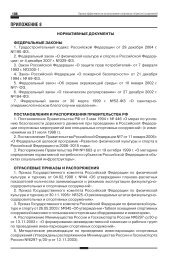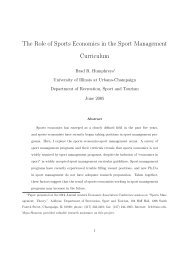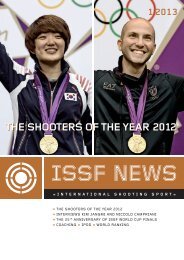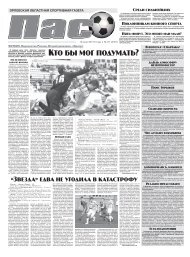Create successful ePaper yourself
Turn your PDF publications into a flip-book with our unique Google optimized e-Paper software.
Practice<br />
Sucks!<br />
by Charlie Williams<br />
Charlie Williams is one of the world’s<br />
top players and personalities. Charlie<br />
won the BCA Junior Nationals at 14<br />
and is now a 10 year veteran on the pro<br />
scene, sponsored by Predator. Founder<br />
of Dragon Promotions, he produces over<br />
40 international events each year. He<br />
also manages and coaches pool stars Yu<br />
Ram Cha and Shanelle Loraine. Visit<br />
dragonpromotions.com or email questions<br />
to charliedragonwilliams@gmail.com<br />
22<br />
P&BÊA ugustÊ2009<br />
P<br />
racticing sucks. Yup. 98% of players<br />
I know agree with that statement.<br />
Of course there are players who<br />
love to practice, but wait till they get to a higher<br />
level and let’s see if they feel the same. It’s the<br />
dreaded day in and day out routine of having<br />
to go hit balls for hours so that supposedly<br />
it will pay off later on down the line.<br />
But what really stinks is when sometimes you<br />
practice and that doesn’t happen. Great feeling.<br />
Practicing unfortunately is a vital key in improving.<br />
Competition is the other important key, but both<br />
are needed to improve at a fast rate. It’s like having<br />
a hamburger without the bun, or eating the bun<br />
with no burger inside. The combination of having<br />
both is what makes the hamburger complete.<br />
So it goes with practicing and competition.<br />
This month, let’s focus on the importance<br />
of practice, dreaded though it may be.<br />
Most players I know believe that as long as you<br />
head to the<br />
poolroom and<br />
hit balls you<br />
will get better.<br />
Wrong. Players<br />
also say that if<br />
you are playing<br />
with your sparring<br />
partner that will<br />
improve your<br />
game. Wrong<br />
again. In order<br />
to practice more<br />
efficiently, you<br />
have to get much<br />
more specific<br />
in what you<br />
are doing with your time on the table.<br />
First of all, you should spend a significant time<br />
playing alone. The temptation of playing with<br />
others is always huge, but sometimes you have<br />
to deny yourself that pleasure just like you deny<br />
yourself a big fat slice of cheesecake. Can playing<br />
another opponent ever be considered practice?<br />
Yeah, sort of. I would still define that as in the<br />
competition category. Exceptions would be if<br />
you are a 9-Ball player and decided you wanted<br />
to work on your safety play and were sparring<br />
with a very good One Pocket player. I as your<br />
coach would then accept that as practice.<br />
If you are going to have to play someone,<br />
please make sure they play – at a minimum<br />
– the same speed as you, but preferably<br />
always play someone who plays a bit better.<br />
As a teenager I would go play the local pro,<br />
Dave Bollman, who at that time could spot me<br />
the five ball, but I would play him dead even in<br />
cheap sets just to learn. It was a tremendous<br />
benefit to me and gave him some gas money<br />
for his big Cadillac (Thanks, Dave).<br />
But back to the boredom, that unfriendly neighbor<br />
Mr. Practice. Or if you prefer, Mrs. Practice, like one<br />
of my mean elementary school teachers. So Coach<br />
Dragon let you play someone for practice. Consider<br />
that a gift, I was in a good mood. Now it’s time to<br />
get to work on some real practicing, all by yourself.<br />
Unfortunately, most players I see playing alone<br />
do it all wrong. They practice their strengths rather<br />
than their weaknesses. Here’s a self-test: If you go<br />
and practice and it felt really fun, then you probably<br />
didn’t practice the right way. Can you still get<br />
better doing it that way? Sure, a little, like a snail.<br />
Some players tell me they love practicing and<br />
they can play alone for 8-10 hours. When you<br />
are a beginner and<br />
you have tons of<br />
stuff to learn, that’s<br />
easy. But when you<br />
get to advanced<br />
levels, practicing<br />
becomes harder and<br />
competition much<br />
more appealing.<br />
As a beginner, you<br />
can’t beat anyone<br />
so it’s more fun<br />
playing alone versus<br />
playing someone you<br />
never get a chance<br />
to shoot against.<br />
Later on though,<br />
you want to beat on someone because now<br />
you have some ability. You feel the FORCE<br />
young one, but you are not a JEDI yet. It<br />
becomes even more vital to maintain a good<br />
practice routine when you play alone.<br />
What to practice? Well that’s going to depend<br />
on your game level, but try and bust it up<br />
into manageable bites. Spend some time on<br />
long shots, on speed control, on critical shots<br />
(banks, kicks, curve shots, etc.). Spend a bit of<br />
your practice session building up your break<br />
(we talked about this last month) and some<br />
more time working on your defensive game.<br />
At all times, practice as you would compete<br />
– with care to perfecting each shot and its<br />
resulting cue ball position. Practicing may suck,<br />
but it will reward your game in the long run!<br />
ÊÊÊÊwww .poolmag.comÊ

















